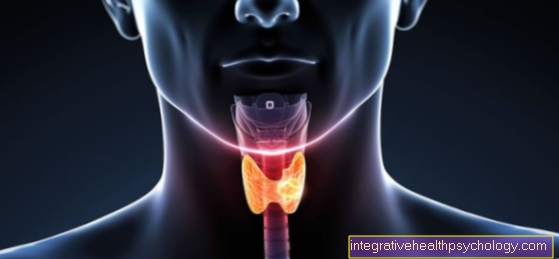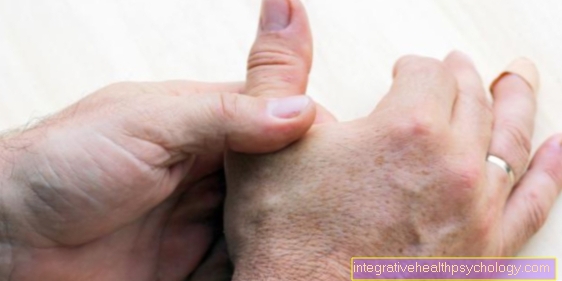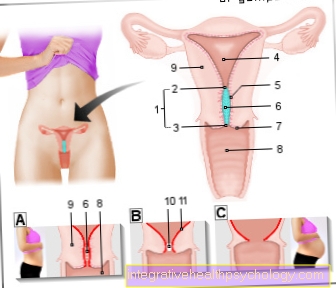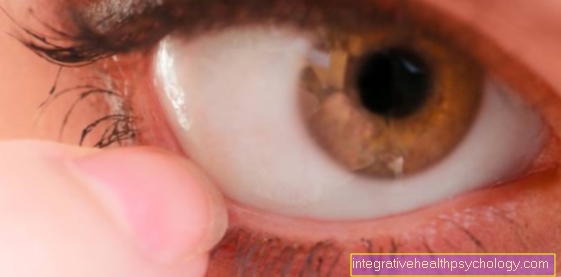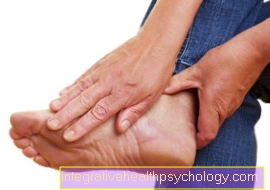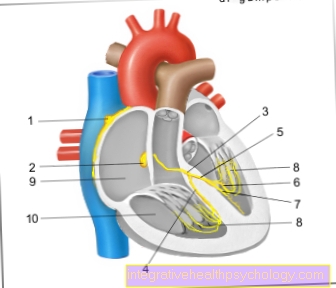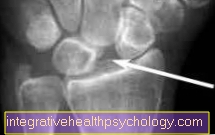Anal fissure
definition
At a Anal fissure it is a very painful, mostly longitudinal one Tear of the anal mucosa.
Symptoms in most cases are pain during bowel movements, itching and sometimes blood deposits on the stool. Anal fissures can be developed by patients of any age. At the most common however, do so between the ages of 30 and 40 on.

Acute anal fissures usually heal after a few days, whereas chronic fissures with scarring can persist for a longer period of time.
The cause for the development can be a increased pressure of the external sphincter, one chronic constipation, Infections or one Association with inflammatory bowel disease be.
causes
The causes of an anal fissure can be very different.
It is assumed that a chronic pressure increase in the anal area, i.e. over a longer period of time, plays an important role in its genesis.
In addition to chronic constipation, such an increase in pressure can also be triggered by a greatly increased pressure in the area of the external sphincter.
Constipation results in hard stools that can only be removed by pressing hard. The particularly thin and sensitive skin in the anal area can tear quickly due to the hard consistency of the stool or during the pressing process.
As a result of long-standing diarrhea or very mushy stools, the skin in the anal area is also strongly irritated and pre-damaged and can promote the appearance of fissures.
Also hemorrhoids promote the formation of anal fissures.
By Infections or inflammatory bowel disease how Crohn's disease or Ulcerative colitis, the mucous membrane is less supplied with blood, more irritated and can show small cracks more quickly.
An existing anal fissure causes severe pain in most cases, so that bowel movements are avoided. As a result, the stool hardens and when the stool is passed again, the mucous membrane is then additionally irritated and can tear further. There is a Vicious circle and chronic fissures can develop.
Symptoms
A fissure in the area of the anal mucosa causes very severe, stabbing and, above all, burning pain when defecating.
You can find more information on the topic here Burning in the anus, pain in the anus
In addition, blood may build up on the stool or toilet paper.
Most patients also report severe itching in the area of the anus and a weeping effect. The open areas continuously release wound exudate, so that the underwear has to be changed frequently.
Read more on the topic Itching around the anus, anal cancer
In addition, the areas burn and in very pronounced cases the patients can no longer sit without severe pain.
The shame that arises in many patients leads to an involuntary spasm of the sphincter, as one tries to avoid the painful sitting down. Due to the cramping of the muscles, more pressure is required the next time you go to the toilet, which promotes further tearing of the fissure.
If the fissure has existed for a long time, a particularly noticeable thickened skin develops in the affected area.
Read more on the subject below Pain in the rectum.
Pain
Step into an anal fissure Pain on that by patients as very strong and piercing to be discribed.
They mainly kick during bowel movements and last for a few minutes to sometimes even several hours afterwards.
In the area of the anal mucous membrane there are many sensitive nerve endings that are the trigger for the severe pain that is described as particularly uncomfortable. The pain is directly related to the bowel movement and is very sharp and tearing in character.
Learn more about the topic Pain after a bowel movement
In addition, many patients describe a Burning sensation in the wound areathat especially when caring for the affected area is further intensified. The more the mucous membrane is irritated and tears open, the stronger and more persistent the pain. They can become so strong and unbearable that the patients can no longer sit properly on their buttocks.
They often spend a lot of time standing or lying down to avoid the pain.
Which doctor should you go to?
If one suffers from the symptoms of an anal fissure, one should urgently consult a doctorso that the complaints can be resolved early.
There is one particularly important Extension and worsening of the findings through early treatment to minimize and thereby saving the patient unnecessary suffering.
If you have an anal fissure, you should contact one Specialists, a so-called Proktolgen, turn. This is a specialist doctor who deals with diseases of the rectum.
Otherwise you can do one Gastroenterologists seek out.
In the case of the symptoms described, these specialists can also look for other causes and possibly identify more serious ones, such as cancerous ulcers, or also reliably rule them out.
How do I treat an anal fissure?
Various therapeutic options are available for treating an anal fissure.
First, a distinction must be made between an acute and a chronic anal fissure.
A acute anal fissure is usually treated conservatively, i.e. without an operative measure. Be used Ointments that have a relaxing effect on the lower sphincter exercise in the anal area and thereby facilitate bowel movements.
The attending physician can also request a Prescribe ointment that has an anesthetic effect and inhibits the strong, stabbing pain. Also has Penaten® cream Successes shown in inflammation relief.
A intensive care should also be operated so that the wound can heal better and does not become additionally infected. Therefore, the wound should be disinfected twice a day before applying the ointments and creams.
Important It is important to ensure that a thorough and extensive treatment is carried out before each wound treatment Wash your hands should be done so that no germs can be spread and infect the wound additionally. It is best to wear gloves.
The doctor can also do one Anal stretcher that patients can use to stretch the cramped sphincter and facilitate defecation.
Above all it is important much to drink and enough fiber through eating. This makes the stool softer in consistency.
Are the conservative treatment methods not enough, or are already lying very chronic anal fissures are possible in most cases do not go without surgical therapy.
Ointments and creams for an anal fissure
An acute, newly appeared anal fissure can be very effectively treated conservatively with creams and ointments.
It will Anoint used the Relax the lower sphincter apparatus and thus can facilitate defecation. Their effect can be due to so-called Calcium antagonists and Nitrateswhich lead to a relaxation of the smooth muscles in the area of the sphincter muscle.
Furthermore, ointments are made with a pain relieving effect used. These include preparations such as Posterisanwhich can be applied to the wound in the mucous membrane area 2 to 3 times a day. They contain Lidocaine, an anesthetic that numbs unpleasant pain by inhibiting the transmission of impulses to the existing nerve fibers in the anal area.
The narcotics are alternatively also in the form of insertable suppositories available.
In addition, the attending physician can also enter the area of the anal fissure Inject anesthetic with a syringe.
Symptoms such as itching, pain and burning are relieved and are no longer as noticeable.
You should also eat a balanced, high-fiber diet and drink sufficient fluids to prevent constipation.
Acute anal fissures usually heal on their own with no consequences if the preparations mentioned and an adapted diet are used.
Operation of an anal fissure
If conservative measures are not sufficient to treat a fissure in the anal area, the patient must undergo surgical treatment in most cases.
There one Surgery always involves risks, one has to educate the patient about possible complications.
In the anal area and especially near the external sphincter, nerve fibers can be damaged.
Following the surgery there may be a no longer correctable fecal incontinence come, i.e. an inability to specifically hold back the stool.
Besides, it comes often to infections after the operation, which can arise quickly due to the very high colonization of germs in the anal area. They can spread and lengthen and complicate the long healing process after surgical treatment of the anal fissure.
The surgical procedure is usually carried out under a Short anesthesia or one regional anesthesia.
There are different approaches available. Usually the anal fissure and the adjacent tissue areas are completely removed so that no damaged tissue remains. During the erosion are also Tissue samples taken and sent to pathology for a possible to be able to safely rule out cancerous process.
At chronic anal fissures usually form rough, protruding skin folds which are also removed.
In particularly difficult cases, a small portion of the external sphincter removed with it, whereby a considerably high risk of long-term faecal incontinence is to be expected.
A newer method consists of the injection of Botox during the surgical treatment of an anal fissure. Botox® leads to a relaxation of the external sphincter and thus makes it easier to pass stool. The disadvantage of this method, however, is that it can only be effective for about 3 months and is very expensive.
The cure after surgical treatment of the anal fissure lasts in the Usually 4 - 6 weeks and can sometimes take longer. On top of that, through complications after surgery, such as infection, the The healing process is additionally extended can be. Overall, however, the healing is different for each patient.
In the first days and weeks, the wound healing sometimes causes uncomfortable pain, which, however, becomes significantly better in the course of the process and shows itself in decline.
Due to the open healing of the wound area, a Burning and oozing arise and the bowel movement prepares stinging and pulling in the first few days Pain.
The wound can initially also still bleed easily and especially disturb when sitting. As a result of the operation, the tissue is initially still heavily stressed and irritated. During the healing process they need Patient often something patiencebut in most cases completely heals the anal fissure and without damagewho stay behind from.
Duration of healing of an anal fissure without surgery
An acute, uncomplicated anal fissure has a good prognosis with conservative treatment.
By a adequate anal hygiene and the consistent application of important treatment principles heals the anal fissure usually within a period of 2 to 3 weeks completely.
By a intensive and regular use the prescribed Anoint On the one hand, the pain is relieved and the wound area is cared for, dries out and the damaged skin slowly begins to regenerate.
Since an anal fissure can recur even after it has healed well, it is particularly important the most common cause den hardened bowel movements, continue to treat.
A diet rich in fiber or the addition of so-called swelling agents, such as linseed, makes the stool soft and pliable in its consistency and can be removed more easily and without pressing hard. Long-term healing and a reduction in the risk of developing new anal fissures can only be achieved with soft stool.
Read more on the subject here Diet for constipation

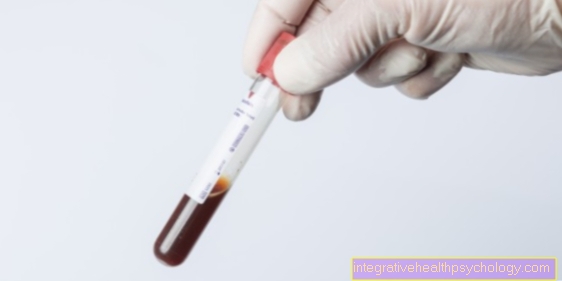
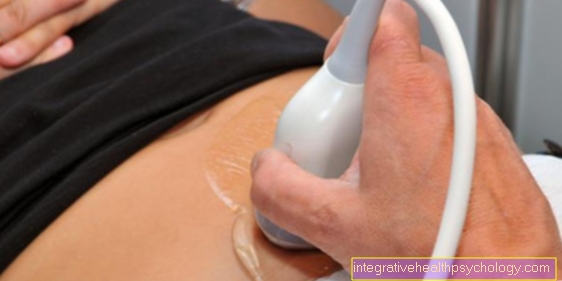

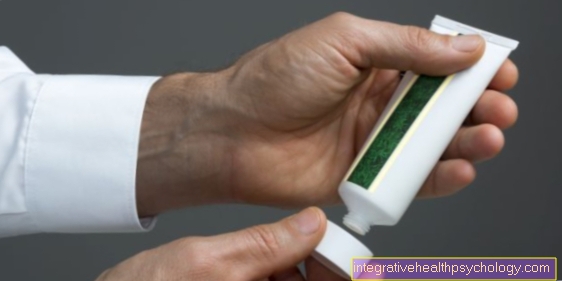
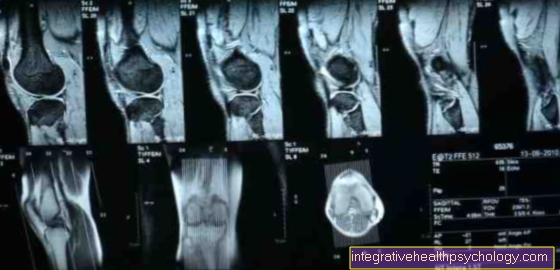
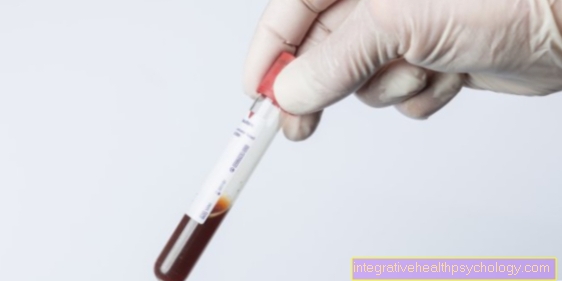



.jpg)
